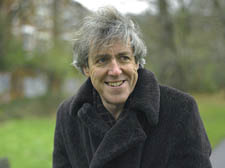
Griff Rhys Jones |
Funnyman Griff’s journey to his past
Griff Rhys Jones found memory can be deceiving as he researched his autobiography, writes Dan Carrier
Semi-Detached: Pulling Up Roots in Suburbia by Griff Rhys Jones.
Published by Penguin Michael Joseph, £20.order this book
IT is remarkable how objective history is, says Griff Rhys Jones. “It is an obvious point,” he says, “but one which really came home to me as I sat and composed this book.”
The TV presenter and comedian was trawling through his past as he put together his autobiography, Semi-Detached, and wanted to check the ‘facts’ of his early years.
So he went to school reunions – and rather coming away with his memories confirmed, his eyes were opened instead to the mysterious nature of how the mind decides what it will store and what it will discard.
Mr Rhys Jones, 53, who lives in Fitzrovia, said: “It was time to start thinking about my past, and I found there was a theme to the book, which I had not automatically set out to write.
“I went to reunions and found memories are very strange. People would say: ‘Do you remember this?’ and I hadn’t a clue what they were talking about.
“I wanted to make sure I was correct in my memories – but people said to me they hadn’t any memory of events which I had felt were quite defining to me as a young man, and this demonstrated a lot of information that could be defining is sorted and stored. It made me wonder about the concept of collective memory.”
Rhys Jones was the son of a doctor and grew up in Epping. He also returned to his childhood house to trigger memories – and came away with a fresh take in the street he spent his formative years.
He said: “I had never been really aware of how comfortingly suburban our house was. I decided I would quite like to live in one of these dignified Edwardian mansions now; not the new ranchero-style maisonettes, with their steep drives, fake clapboard and hump-backed miniature lawns squeezed into the former gardens of the grander homes, but in one of the grander homes themselves, of course.”
And although much was unchanged – the barbershop which gave him an unfashionable short back and sides as a teenager still operated under the same name – the wants of the inhabitants of Epping were definitely different.
“It was effectively 30 years since I had been in Epping,” he says. “A billboard advertised ‘Holistic Massage’ on Thursday and ‘spiritual healing, shiatsu and reiki teaching’. when I was last there, every shop in the high street sold shoes. Nowadays the holistic clinic was joined by two acupuncture centres, a Chinese herbalist and ‘Positively healthy, the healthy living shop’ in our old doctor’s surgery. Nobody came into the town for white stilettos any more. They came to get their auras read.”
His sociological considerations of the change his former neighbours have undergone is only part of his story.
Rhys Jones is a conduit through which the evolution of British society in the 1960s and 1970s can be traced.
“This is partly the aim of the book,” he admits.
“I wanted to find common themes which other people of my generation may recognise.”
He name checks a number of cultural references – and not just the usual, obvious ones, such as 1960s music and clothes. In his earlier days he recalls ‘the black plastic Armalite rifle from Woolworths’ with real clip-on, knife-shaped bayonet in slightly bendy plastic.
And then there was the advent of the TV. “It was a novelty for us,” he says. “It arrived in our house as a flickering fuzz the size of a paperback, and must have taken at least five minutes to dominate our lives.
“We were only ever allowed to watch the BBC, and the BBC, of course, only had one channel. Even then, class-based quarantine was extended to certain specific programmes.
“My father refused to allow us in any circumstances to watch the blameless Dr Kildare. He resented the way that his patients arrived suffering imaginary symptoms and demanding instant miracle cures.”
Rhys Jones’s public persona has recently undergone a transformation. Whereas in the past he was known primarily for his comedy, he has always nurtured an interest in architecture and the built environment – which, subconsciously, his book refers to time and again. He has recently presented the successful BBC TV show Restoration, which trawled the UK for historic but run down buildings.
On the doorstep of his Fitzrovia home is a building which he would love to see re-opened to the public – formerly known as the Post Office Tower, and now owned by British Telecom.
“I would love to see the revolving rooftop restaurant re-opened,’ he confesses. The restaurant was closed in 1980 when it was feared it would be targeted by the IRA in a terrorist attack.
“Architecture tends to reflect the mentality of the time it was built. You have to think of them as a statement that speaks to us, as much as a historical statement.” It is this sense of history that has pervaded his autobiography, and makes it more than just a personal tale.
|



